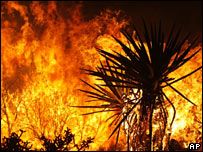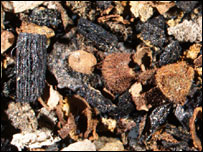The history of fires was discovered thanks to coal.
British scientists have discovered the history of fires by studying ancient coal lumps around the world.
 Fossil samples show that the range of effects of fires over time is closely related to the level of oxygen in the atmosphere.
Fossil samples show that the range of effects of fires over time is closely related to the level of oxygen in the atmosphere.
Andrew Scott and Ian Glasspoo said a large portion of the planet was burnt when gas accumulation reached a peak some 275 million years ago.
Their research is published in the American scientific journal of the National Academy of Sciences.
"People think that the coal they removed from a fire is just a discarded object, but see it under a microscope and you'll see that it has a beautiful look on the physical structures of plants. '
He told the BBC that 'In other words, coal not only saved information about the fire but also said which plants were burned. This means we can know whether the fires spread to a large area. "
The impact of oxygen
 Fragments of trees include coal (black) from the carbon century (Photo: dost-dongnai) Coal is almost pure carbon and is not changed during fossilization.
Fragments of trees include coal (black) from the carbon century (Photo: dost-dongnai) Coal is almost pure carbon and is not changed during fossilization.
Scott and Glasspool, members of the Field Museum in Chicago, studied the rest of the coal stored between 250 and approximately 440 million years ago.
Scientists believe it is a time when plants first dominated the earth and quickly covered the earth's surface.
Research coal samples from around the world include the United States, Australia, Scotland, India, Norway, South America and the south pole.
Scientists studied coal to determine the types of coal-generated fires and their possible effects. They then compared those types of fires created by other scientists to explain how the amount of oxygen in the atmosphere is thought to have changed over time.
And there seems to be a great connection.
The research team found that during the first 50 million years of plant evolution, there were few fires and was limited to one area but then the fires increased frequently when the oxygen level in air increased.
About 365 million years ago, many devastating fires occurred throughout the planet. The level of oxygen in the air 275 million years ago reached the highest level of 30% while compared to today, the oxygen level is only 21%. During this period, even low-grass plants can easily catch fire and lead to more fires.
The whole earth.
 Great details are seen through cutting-edge electron microscopy. (Photo: dost-dongnai) Professor Scott said 'Beginning in the late Devonian period, about 365 million years ago, fires had increased rapidly'.
Great details are seen through cutting-edge electron microscopy. (Photo: dost-dongnai) Professor Scott said 'Beginning in the late Devonian period, about 365 million years ago, fires had increased rapidly'.
'It was thought that the fires increased faster than at the end of the Devon century, but it seemed that the rapid increase in fires occurred at the same time as the rapid increase in oxygen in the atmosphere and the rapid increase in this level of oxygen graphed by people for review. So, this is the first time people have used coal information to limit the oxygen charts in the atmosphere. " - He said the importance of coal has not been noticed by many geologists.
He said it is clear that fires are an integral part of the earth's system and that changes in the atmosphere and climate are influenced by fires but at the same time affect the occurrence. fires
The fire maintains certain systems. If more carbon is joined together and buried into coal, then the amount of carbon dioxide in the air will disappear and this will cause climate change.
"The stage we studied was the period when the earth's climate was quite cool and the sea level was lower; therefore, there was a lot of soil for plants to grow. And once the amount of oxygen in the air increased. The trees are very flammable, even the trees are wet, so you will get different feedback results. "
'From the perspective of the earth's systems, the factors that constitute a fire are so important, but so many geologists in this area have ignored coal, considering them as real debris. things and throw them away. '
'When people realize the content of coal and its meaning, it is hoped that more people will collect it then.'
- The most horrifying fires in human history
- Where can mercury in the air come from
- Secret of the most haunting fire in American history
- 4,300 Vietnamese died prematurely due to coal gas in 2011
- How is coal formed?
- Indonesia will be the first country to liquefy coal gas
- Unique sculpture on coal in Quang Ninh
- Breathtaking view of a coal mine burning for 3 weeks
- Asia with a hungry stomach and polluted cities
- Coal, the biggest environmental devastator
- Finland will become the first country without coal
- 'Fire attack' raged in America, thousands of people evacuated
 Discovered an ancient centipede fossil 99 million years old
Discovered an ancient centipede fossil 99 million years old Discovered bat-like dinosaurs in China
Discovered bat-like dinosaurs in China Discovered a 200-year-old bronze cannon of the coast
Discovered a 200-year-old bronze cannon of the coast Discover 305 million-year-old spider fossils
Discover 305 million-year-old spider fossils